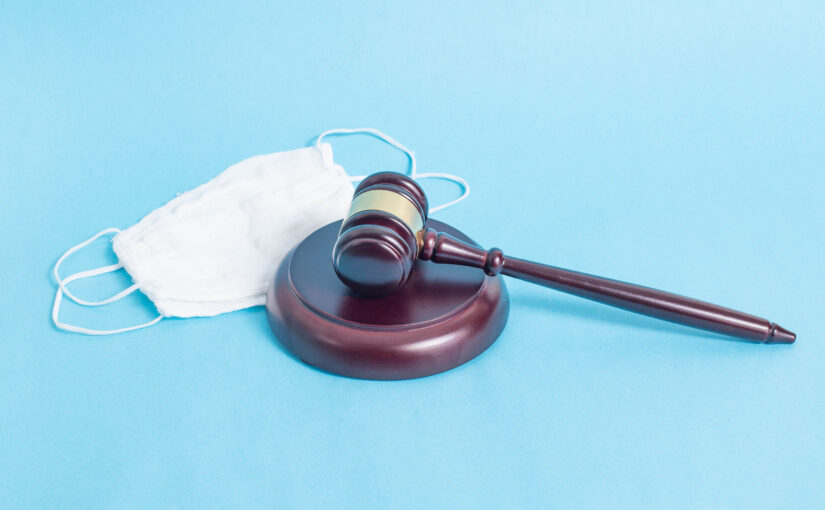On October 22, 2020, Governor Whitmer signed into law House Bill 6159, creating a Pandemic Health Care Immunity Act to protect health care workers against liability for claims arising out of care provided in response to the COVID-19 pandemic. This law was part of a package of COVID-related bills signed last week that included a law that protects businesses that comply with “all relevant COVID-19 related statutes, orders and rules issued by federal, state, and local authorities” from liability if an employee becomes sick at work.
Gov. Whitmer’s approval of HB6159 implements a Pandemic Health Care Immunity Act to “provide immunity for health care providers and health care facilities in the event of a pandemic, and to clarify the time frame for the immunity.” This development is good news for health care facilities and their employees who have rendered care to COVID-19 patients, including nursing homes, surgical centers, and hospice facilities, as well as virtually all health care providers.
The Act will retroactively apply to the time period at the outset of the COVID-19: March 10 – July 14, 2020. The Act is silent as to any specific enumeration of what acts or omissions would constitute “health care services in support of the state’s response to the COVID-19 pandemic.”
HB6159 was the legislature’s second attempt to implement liability protections for COVID-19-related care in the wake of the current pandemic. The first attempt arrived via Senate Bill 899, which was vetoed by Governor Whitmer on August 10, 2020. SB899 would have established immunity from any act or omission by a health care provider or facility “rendered in support of Michigan’s response to the COVID-19 pandemic” during the period from March 10, 2020 to January 1, 2021.
SB899 defined “health care services rendered in support of the state’s response to the COVID-19 pandemic” as services provided to those with confirmed, presumed, or suspected COVID-19. Governor Whitmer’s August 10 veto letter stated that SB899 “would endanger patients and workers unnecessarily, making it nearly impossible to obtain relief from injury during a state of emergency.”
The house bill that was signed into law does not provide as much protection for healthcare facilities as the senate bill, nor does the immunity period last as long as it would have for the senate bill.
Healthcare facilities need to be aware of these changes, as they result in increased exposure than what would have resulted had the prior senate bill become law. Either way, it should be expected that experienced plaintiff’s attorneys will develop arguments that try to avoid the protections of the Act. As the pandemic continues, our attorneys will continue to monitor any additional legislation related to the Act.
With regard to employers, the new law protects businesses that comply with “all relevant COVID-19 related statutes, orders and rules issued by federal, state, and local authorities” from liability if someone becomes sick at a business. When employers follow those rules, they are protected from liability under the Michigan Occupational Health and Safety Act if a worker gets sick at work. The law also allows employees to stay home over virus concerns and would prohibit retaliation if they stay home after they’ve been exposed or show symptoms of COVID-19.
FBMJ attorneys are ready to assist healthcare facilities and employers interpret and implement these changes in the law. For more information about how we can assist you, contact us today at 734-742-1800.
December 2020

Michigan Gov. Signs Law Giving Healthcare Facilities Liability Protections
On October 22, 2020, Governor Whitmer signed into law House Bill 6159, creating a Pandemic Health Care Immunity Act to protect health care workers against liability for claims arising out of care provided in response to the COVID-19 pandemic. This law was part of a package of COVID-related bills signed
October 2020

FBMJ CARES: Winter Coat/Gear Drive for Foster Closet of Michigan-Western Wayne County
Cold weather is upon us and so is the community’s need for donations of cold weather gear. FBMJ Cares is collecting winter coats/gear to donate to the Foster Closet of Michigan-Western Wayne County. The Foster Closet is an all-volunteer, tax-exempt non-profit organization providing aid to the Foster Care Community. Often children
September 2020

FBMJ Congratulates Firm’s Michigan 2020 Super Lawyers® and Rising Stars® Attorneys
Foley, Baron, Metzger & Juip, PLLC is pleased to announce that ten attorneys have been named by Super Lawyers magazine to the 2020 Michigan Super Lawyers and Michigan Rising Stars lists. Super Lawyers, a Thomson Reuters business, is a rating service of outstanding lawyers from more than 70 practice areas who
September 2020

Pharmacies Can Be Sued For Ordinary Negligence But Not Medical Malpractice
By: Nicole Joseph-Windecker In its unanimous unpublished decision of Estate of Kevin Karl Gottschalk, by Kathleen Tocco, Personal Representative. v. Plumbrook Pharmacy, et al., the Michigan Court of Appeals held that pharmacies cannot be sued for medical malpractice as a matter of law. This ruling on September 17 was consistent with
September 2020

FBMJ Attorney Joseph McGill Elected Treasurer of the State Bar of Michigan
Foley, Baron, Metzger & Juip PLLC is pleased to announce that Joseph McGill, a principal with the firm, was recently elected as the treasurer of the State Bar of Michigan for the 2020-2021 bar year. McGill will be sworn in by Justice Bridget McCormack of the Michigan Supreme Court at
September 2020

FBMJ Attorneys Featured Presenters at MSHRM Event
FBMJ attorneys, Clyde M. Metzger and Mitchell C. Jackson, presented “Avoiding (Digital) Skeletons in the (Electronic) Closet” to the Michigan Society of Healthcare Risk Management (MSHRM) on September 16, 2020, as part of its Webinar series. The presentation covered current trends and legal issues surrounding the preservation of electronically-stored information (“ESI”),
September 2020

Attorney Anthony Pignotti Authors Article on COVID-19 Executive and Administrative Orders and Their Impact on the Legal System for MDTC Quarterly
FBMJ attorney Anthony Pignotti authored “Summary and Analysis of Executive and Administrative Orders Issued in Response to the COVID-19 Pandemic and Their Impact on the Legal System” for the September 2020 issue of Michigan Defense Quarterly Volume 37, No. 1 – 2020. The article addresses how COVID-19-related executive and administrative orders
August 2020

FBMJ Attorneys Win Change for Toxic Tort Causation Standards in Michigan
FBMJ Attorneys recently prevailed in convincing the Michigan Court of Appeals to require more stringent causation proofs from plaintiffs in toxic tort cases. The case will have far reaching consequences for all toxic tort cases, as the opinion brought causation analysis in Michigan toxic tort cases in-line with the causation
August 2020

2021 Medical Marijuana Licensing Fees – Not So High
The annual regulatory fees set by state regulators and paid by licensed medical marijuana businesses are significantly decreasing – by up to 70% for some licensees. The decrease in these fees, which cover costs incurred by the state in maintaining the state medical marijuana program, is a welcome development to
July 2020

Court of Appeals Cites Denney Damages in Medical Malpractice Ruling for the First Time
By: FBMJ Attorneys Sarah Berard, Daniel Cortez, Juliana Khalifeh, and Saulius Polteraitis. A decision July 30, 2020 from the Court of Appeals applies, for the first time in a medical malpractice case, a controversial 2016 opinion that allows plaintiffs in wrongful death cases recovery of lost wages of the decedent as

